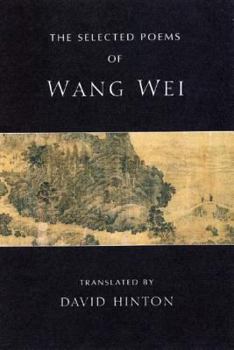The Selected Poems of Wang Wei
Select Format
Select Condition 
Book Overview
Wang Wei (701-761 C.E.) is often spoken of, with his contemporaries Li Po and Tu Fu, as one of the three greatest poets in China's 3,000-year poetic tradition. Of the three, Wang was the consummate... This description may be from another edition of this product.
Format:Paperback
Language:English
ISBN:0811216187
ISBN13:9780811216180
Release Date:June 2006
Publisher:New Directions Publishing Corporation
Length:128 Pages
Weight:0.40 lbs.
Dimensions:0.4" x 6.1" x 9.0"
Customer Reviews
4 ratings
Buy it if you can!
Published by Thriftbooks.com User , 20 years ago
This thin volume of English translations of selected poems by Wang Wei is a real treasure. It is long out of print, so it will be necessary to look for used copies. The translations are lean and sharp, reflecting to some degree the sparse and allusive nature of the poems in the original language. I come back to this book again and again for sheer aesthetic pleasure. Some mention is made of Wang Wei as a "Buddhist poet." Personally, as a Buddhist, I do not find his poems to be "Buddhistic" but rather naturalistic. One can read Buddhism into Wang Wei's poetry, but only with some effort. The only drawback to the volume is a physical one: like so many Penguin books, it is printed on non-archival paper which yellows quickly over time. So handle it with care. Other than that it is a lovely collection and is an excellent companion to the Barnstones' more recent collection of Wang Wei.
A useful introduction for newcomers to Wang Wei.
Published by Thriftbooks.com User , 23 years ago
POEMS OF WANG WEI : Translated with an Introduction by G. W. Robinson. 144 pp. (Penguin Classics). Penguin Books 1973, and Reissued.Wang Wei (+ 699-761) is one of the greatest poets in Chinese literature. During his life he experienced a number of political upheavals, and divided his time between the court and his country estate, where he drew inspiration from his beautiful natural surroundings and solitude. His poems, though deceptively simple, can conceal real depths, and, since he was a Buddhist, some exposure to Buddhist thought may be necessary to fully appreciate some of them.The present book, after a brief 12-page Introduction, gives us over one hundred of Wang Wei's poems, lightly annotated and in adequate translations which are of varying degrees of success. Here is an example of Cooper's style at his best (with my obliques added to indicate line breaks), a short poem entitled 'Return to the Wang River' :"Distant bell sounding at the mouth of the valley / Fewer and fewer the fishermen and woodmen / Away in the far mountains it is evening / And I am going alone towards the white clouds home / Water-chestnut flowers so delicate so hardly still / Willow catkins so light so easily fly / Colours of spring on the banks of the marsh to the east / And I am melancholy as I shut my door" (p.63).The book, which also includes a brief Bibliography and finding numbers for all the poems, would make a useful introduction for anyone new to Wang Wei. But if, after reading it, you'd really like to discover what lies behind Wang Wei's seeming simplicity, and learn something of how his poetry works, you might take a look at the excellent bilingual anthology by Wai-lim Yip which contains a detailed treatment of a number of his poems. Details are as follows :CHINESE POETRY : An Anthology of Major Modes and Genres. Edited and translated by Wai-lim Yip. 358 pp. Durham NC and London : Duke University Press, 1997. ISBN 0-8223-1951-9 (pbk.)
Poems from a Master
Published by Thriftbooks.com User , 23 years ago
Of the Chinese poets, Wang Wei has a special quality of painting with words. This collection is representative of his writing and will delight those who have read Wang Wei's poems and will provide a good introduction to those searching for a remarkable poet.
Truly, the West is too slow to learn @ Easter treasures
Published by Thriftbooks.com User , 25 years ago
This book qualifies as the best medicine against stereotypes, of which the infection is so great.. College professors cannot be fired (a lifeteime paycheck) when they do not have the knowledge, or the passion, or the desire to learn... attorneys will say that the story of their ignorance is simply defamatio... the proof? They have degrees in some other field!!! Benjamin Franklin did not even attend High School, yet, among his many pionering endeavors, there is the railroad..yes, Franklin, a railroad pioneer. George Washington did not attend West Point. Etc. So, where does Academia get its airs?





